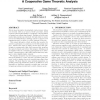Free Online Productivity Tools
i2Speak
i2Symbol
i2OCR
iTex2Img
iWeb2Print
iWeb2Shot
i2Type
iPdf2Split
iPdf2Merge
i2Bopomofo
i2Arabic
i2Style
i2Image
i2PDF
iLatex2Rtf
Sci2ools
105
click to vote
ATAL
2015
Springer
2015
Springer
Bitcoin Mining Pools: A Cooperative Game Theoretic Analysis
Bitcoin is an innovative decentralized cryptocurrency whose core security relies on a “proof of work” procedure, which requires network participants to repeatedly compute hashes on inputs from a large search space. Finding one of the rare inputs that generates an extremely low hash value is considered a successful attempt, allowing miners to approve new transactions and, in return, to collect rewards in bitcoins. This reward allocation, which provides the incentive for miners to participate, is a random process with a large variance. Miners who desire a steady income thus often participate in mining pools that divide among their members the earned rewards, and reduce this variance. Mining pools are slightly better at coordinating participants due to lowerlatency communication, a fact which implies that they manage to collect slightly higher rewards. We examine dynamics of pooled mining and the rewards that pools manage to collect, and use cooperative game theoretic tools to analyz...
| Added | 16 Apr 2016 |
| Updated | 16 Apr 2016 |
| Type | Journal |
| Year | 2015 |
| Where | ATAL |
| Authors | Yoad Lewenberg, Yoram Bachrach, Yonatan Sompolinsky, Aviv Zohar, Jeffrey S. Rosenschein |
Comments (0)

